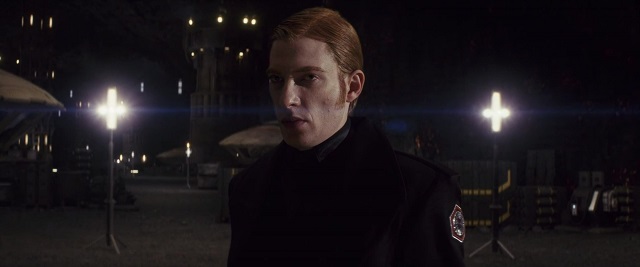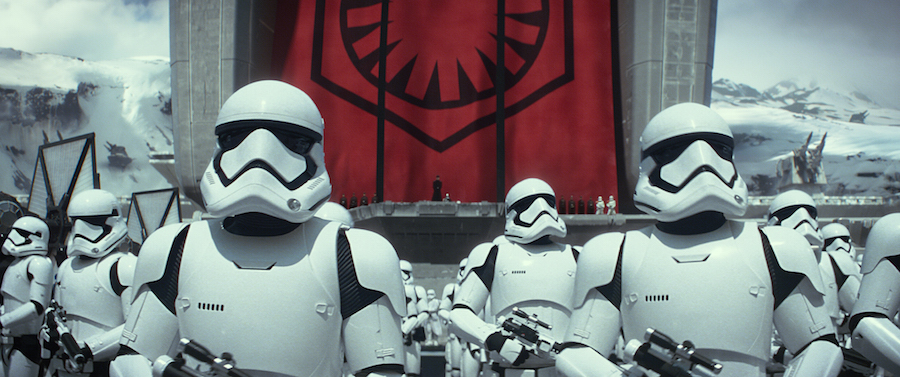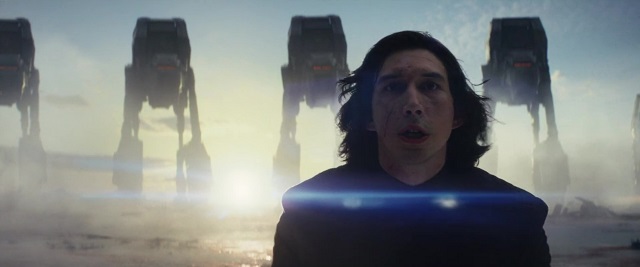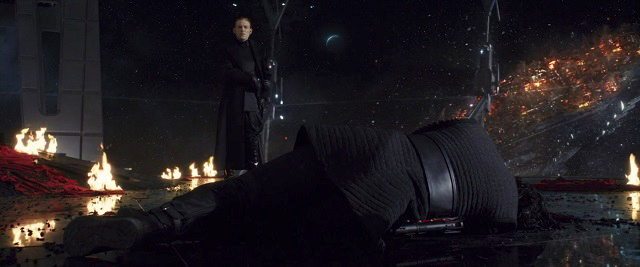
One of the biggest early distinctions between the Expanded Universe and the new canon was how quickly the Empire appeared to collapse. This was partly due to Timothy Zahn and others having a freer hand in interpreting Return of the Jedi‘s happy ending than Chuck Wendig did when writing Aftermath, but more broadly, the EU and its foundation in the worldbuilding of West End Games tended toward a “maximalist” view of the Galaxy Far, Far Away.
This means, speaking very roughly, that the million worlds or so which comprised the Empire were treated, for the most part, like a million Corellias—the Empire was a tightly-knit society with a largely cosmopolitan shared (read: imposed) culture linked by a pervasive HoloNet. A hardened state whose leader was genuinely supported by most of his people, and who had a million Corellias’ worth of capital ships floating around to do his bidding. The tactical significance of Palpatine’s death was in the blow to Imperials’ morale and cohesion, but the vast majority of them remained Imperials. Their defeat was a fifteen-year game of Risk: countless military engagements and a slow chipping away of territory and resources until surrender and extermination were the only choices left.
In the new canon, on the other hand, “galactic society” is a much looser concept, and the Empire was more akin to a house of cards. While initially popular, of course, and still performing the role of a benevolent leader when necessary, Palpatine saw the Death Star as a means of keeping everyone in line, not just a fringe of Rebel hotbeds. He strung the Imperial Senate along for twenty years on the expectation that Krennic and/or Tarkin would eventually deliver his trump card, and when he dissolved and arrested the Senate only to lose the Death Star immediately afterward, in a sense, that was the ballgame. Dissent was everywhere now, and while the fleet was indeed mighty, no canon military force could have maintained order on a million unruly worlds at once.
That said, the Empire was built on the bones of the Galactic Republic, and it had a certain institutional legitimacy that went a long way toward holding it in place for over a generation. The Rebellion was a confederation of question marks, from Core World aristocracy to former Separatists, and if stability was your number-one issue the Empire was the only game in town.

The First Order, on the other hand, has none of this. Even if we assume its military might is comparable to the Empire’s during the original trilogy (very debatable, but possible), it represents no institution of any kind, has no constituency to speak of.
We’re told in The Last Jedi‘s opening crawl that the First Order has swept across the galaxy, and later that it will control “all the major systems” within days. This may well be the case, but I would argue that even the Empire’s tenuous hold on the galaxy post-Endor looks positively indomitable in comparison—for a military force without popular support, controlling everything means securing nothing.
And then there’s the First Order’s, well…leadership issues.
Ostensibly in charge of this ascendant military power is Kylo Ren, aloof wizard boy. Ever the Vader imitator, Kylo comes closest to truly reproducing his grandfather’s persona in his relationship with the military—respected, but primarily for his fearsomeness. The parameters of his relationship with Snoke are obscure to the average officer, to say nothing of the average stormtrooper, and even fans came away from The Force Awakens unclear of his deeper motivations beyond “find Skywalker”.
His former master is off the board now (corporeally, at least), but Luke’s final act was to soundly humiliate Kylo in front of the very people he most needs behind him. The First Order already knew him to be rash and tantrum-prone, and with the escape of the Millennium Falcon these personal flaws have now proven a tactical liability. Vader may have been willing to strangle an officer from time to time, but he got results. Kylo, not so much.

One of the many people to witness Kylo’s humiliation, of course, was the man perhaps most in a position to actually do something about it, the man who already that day had come within a few seconds of murdering Kylo: Armitage Hux. Hux is understandably dismissed by many as TLJ’s comic relief, bashed, beaten, and even bitten by everyone he interacts with. In the battle over D’Qar, the subordinate Captain Canady openly bemoans Hux’s failure to launch TIE fighters at the first opportunity, a criticism which is proven correct when the Resistance eliminates Canady’s ship.
General Hux is no strategist; he favors grand gestures over minute-by-minute tactics, and even the hyperspace tracking technology he proudly unveils afterward (the product of brute force rather than ingenuity, Snoke observes in the novelization) is used ineffectually—even with “all this”, he proves unable to deliver the awesome military victory he really wants, only one of slow, arduous attrition. Thrawn he is not.
Yet for all his own flaws, Hux is one thing Kylo will never be: manageable. Snoke describes him as a “sharp tool”, and the novelization goes even further—Captain Peavey, more familiar with Hux’s leadership than Canady, recognizes the general’s strengths even as he looks forward to the day when the Resistance is defeated and more stable officers are needed to bring order to the galaxy. “Hux was a revolutionary,” Peavey muses, “but revolutionaries’ seasons were fleeting.”
With Snoke dead, the Supremacy destroyed, and the Resistance living to fight another day, with whom do you suppose Peavey’s ilk would prefer to ally? Hux may be a brat, but he’s a military brat; they get him, and they seem to know how to deal with him, or when necessary work around him—we see that very plainly at D’Qar. With a galaxy to subdue, Hux seems a vastly preferable scenario to the command of Kylo Ren. And they haven’t even heard his “destroy the past” spiel.
Now, that’s not to say it’d be a simple matter to just topple Kylo and move on; there’s a generational divide in the First Order between the old-reliables like Peavey and the young zealots like, well, Hux. It’s hard to say what the average stormtrooper makes of Kylo, or if disobeying the guy in charge would ever even cross their mind (though certainly there’s one notable example). But that uncertainty is exactly why the old guard would need Hux on their side—and Hux’s barely-contained sneer at the end of the film makes it abundantly clear where he stands on the matter. But Hux isn’t an idiot; he’ll bide his time, and he’ll secure as many allies as possible, and the moment he sees an opening, he’ll make his move.

We don’t know how much time will elapse before Episode IX picks up the story, but I wouldn’t be surprised to find a First Order barely holding itself together, or worse, already consumed by a civil war of its own. Perhaps the galaxy at large will look something like the New Sith Wars of the Expanded Universe, with the good guys a distinct minority but the bad guys too busy fighting amongst themselves to notice.
Now imagine a new generation of Jedi emerging to meet this chaos. With Rey leading the way, imagine a Jedi Order not just protecting those trampled amidst the First Order’s squabbles but serving as an example of a better way to fight—a reminder of what the Republics at their best were supposed to be. Not just a rebellion, or a resistance, but a beacon. A light pointing toward the future.
The old Empire may have been rotten, but its roots ran deep. Many could overlook its evils by telling themselves it stood for something more important. The First Order stands for nothing, wants nothing more than the total annihilation of those who stand against them. But though they stand astride the entire galaxy, their roots are shallow, almost nonexistent. Their collapse will no doubt be catastrophic, but I also suspect it will be very fast indeed.

Interesting thoughts. I wonder, though, whether the First Orders roots might not be deeper than you suggest. We see in books like Bloodlines that there are still quite a few “Old Imperials” about by the time the First Order is sniffing about. Although Episode VIII strongly foreshadows a Kylo-Hux civil war, at the galactic level, the more salient divisions might be between Old and New Imperials. As you note, while the New Imperials might have most of the military power, only the existing old imperials could serve as the larger basis for a galactic political system.
I certainly hope that Episode IX takes up some of these issues, and doesn’t just assume the First Order’s uncontested control of the galaxy.
P.S. – One of the things I like about Hux is just how incompetent he can be. His character has the mindset of an engineer rather than a strategist – whether it is destroying the Republic, wiping out the Resistance Fleet, or even just opening a big door, every problem is solved by the straightforward application of some whiz-bang super weapon. When it works, it works – Hux wipes out the Republic Fleet, and then mercilessly drives the Resistance almost to extinction. But there is no artistry, no sense of Clausewitz’s coup d’oeil. It is exactly what you’d expect from an intelligent, mechanically-minded young man who grew up fantasizing about “the power of the Empire” but who has no actual experience of war. I wonder where he will go, now that there is no Snoke to point him in the right direction.
Well the “old Imperials” we’ve seen thus far have all been officers—or at best, NR senators, though notably that doesn’t include Casterfo or Carise. But when I talk about roots I mean the bureaucracy; the basic administrative apparatus. Palpatine putting the moffs in charge in ANH seemingly amputated all that institutional memory, so to the extent that they came back to set up the NR I doubt there’d be much leftover sympathy for the Empire that discarded them. Canady may have been around back then but I doubt he knows much about governing.
Your description of Hux actually gave me a fun thought: he’s basically a more successful Krennic. He’s good at management and the coordination of large-scale projects but not smart or stable enough to spearhead them himself.
Looking back even with Episode 9 most of this still I think really holds up. Even if we don’t see the uprising of the First Order in detail in Ep 9, it honestly makes sense how the First Order falls. I mean by the end the leadership was all located on one ship that got destroyed on Exegol. Kylo turned back to the light and Palpatine died. So yeah…This article still holds up more or less after 9
Close enough!
I mean when EU stuff gets around to this, it’s not like they’ll be grasping for straws.
I feel like I go back to this article a lot whenever I’m talking about the Post Endor era in general and why things like the Empire feel so quickly and why the New Republic in Canon is the way it is. Because at the end of the day the Galaxy in Canon isn’t the same one we had in legends. I mean sure same names and what not, but the way it all functions and is potrayed is very different, and I think it’s good to “Unlearn what one has learned” when discussing the political context of the galaxy since Canon is very different for how things are portrayed than in Legends and thus those things have to be taken into account.
I think the difference boils down to Legends overestimating the post-Endor Empire’s popular support—they had to lose militarily sector by sector because their people were either still behind them or at least ambivalent. In canon the Death Stars were really Palpatine’s whole ballgame by that point.
I think that is something I like about new canon in general compared to legends is the Galaxies overall rejection of the Empire and the First Order and just Space Fascism in general.
Or sure the Empire has its supporters no doubt, someone gotta man those Star Destroyers and yes sometimes Galactic Society on the whole gets intimidated and unsure what to do or becomes passive. I know I’d might hesitate a bit if someone was pointing a big Death Star or a Starkiller on me. But that doesn’t mean these regimes have massive support. It just means they have the bigger gun.
There is though a almost…optimistic approach that at the end of the day even how entrenched these regimes like the Empire or the First Order (Mostly the Empire ;p) become though they still don’t have a vast majority of support among the large galactic society and man once that spark hits….it lites that fire of rebellion.
Now of course if you wanna take a cynical approach also means galactic society doesn’t embrace the New Republic or democracy per say. But you know…The Empire and the First Order are probably the worst things ever so…Progress (?)